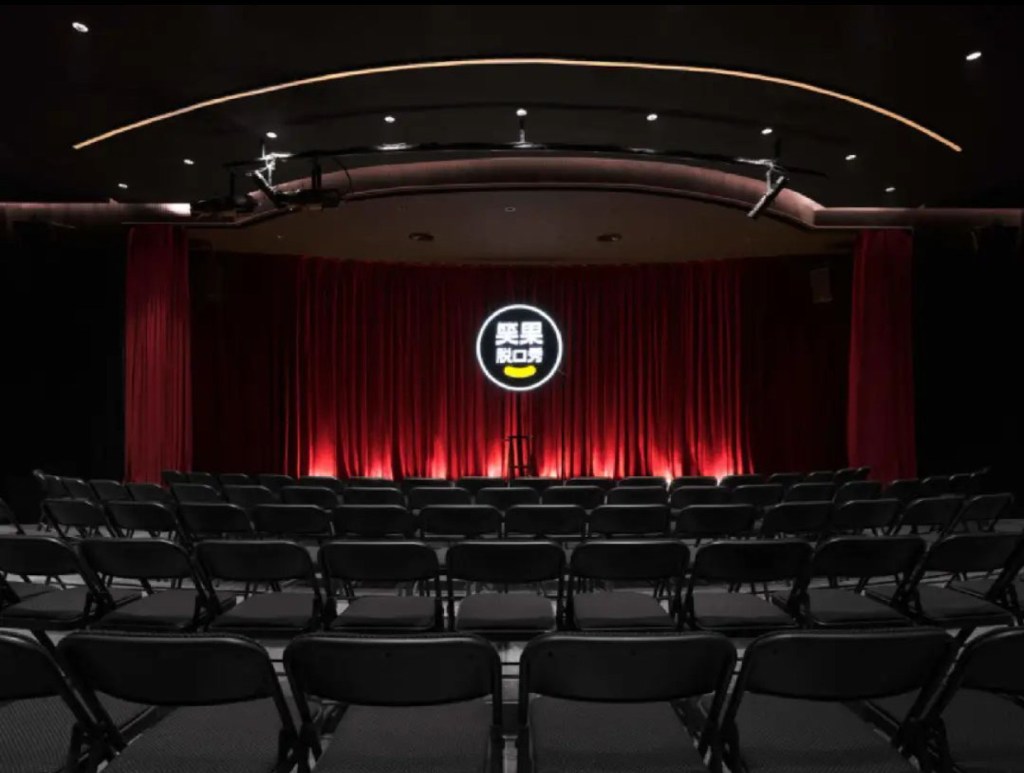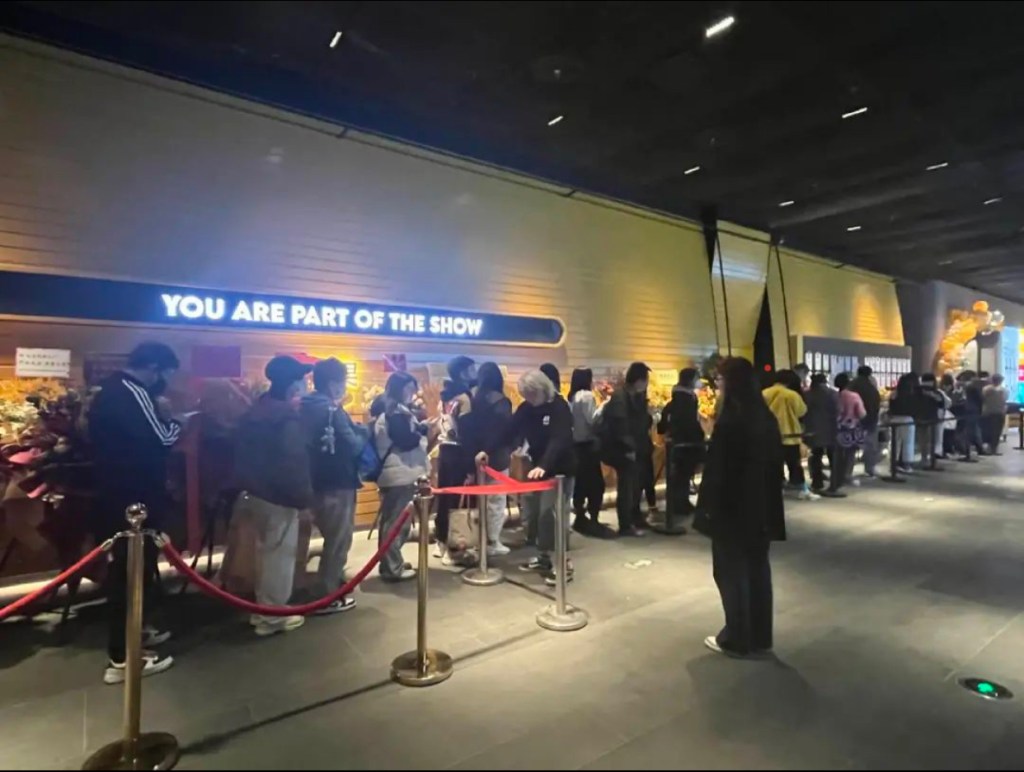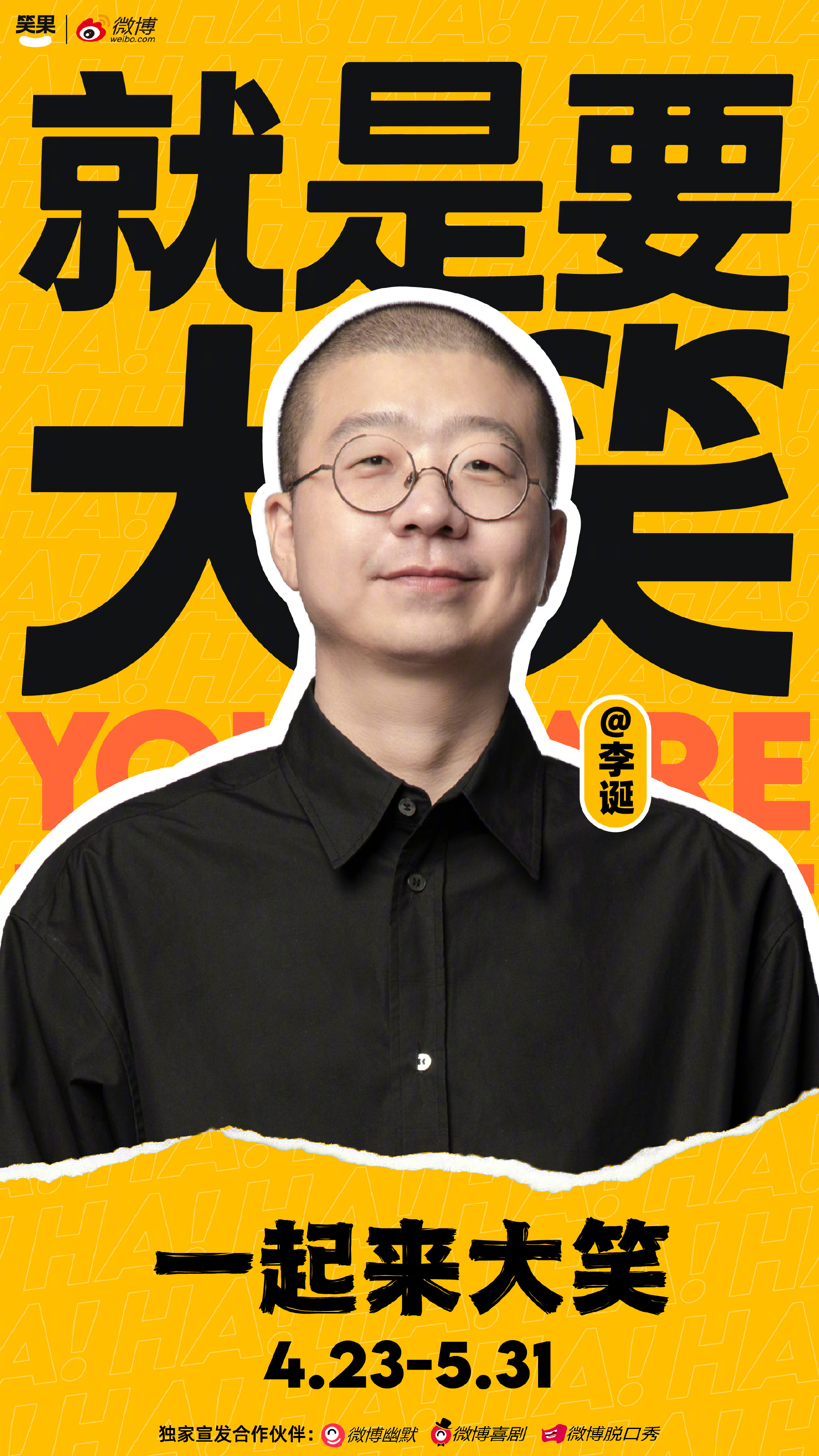Young and Furiously Laughing in China
Young and Furiously Laughing in China
Yaxue Cao, May 28, 2023
Following the Blank Paper protests last November, I realized that I had been caught off-guard by contemporary Chinese youth, especially those born after 1990 and 2000. I didn’t know what kind of people they were, and I had subconsciously written them off from the realm of dissent, assuming that they belonged to a generation that was indifferent to politics and just focused on enjoying life. To correct my blindspots, I began seeking out their writings and hoped to find in-depth explorations about the lives of young Chinese in the media. While doing so, I stumbled upon two comedy shows on YouTube, one is called The Stand-up Comedy Show (脱口秀大会) and the Rock & Roast (吐槽大会). Both are products of a company called Xiaoguo Culture (笑果文化).
Previously, I had no idea that China had stand-up comedy at all, let alone ones that were so popular. Initially, I was taken aback by the lively atmosphere at these laughter-filled events. The audiences were predominantly young people, and the comedians themselves were also mostly young. It all felt a bit out of place to me, a Chinese who had been outside the country for such a long time, but actively and deeply concerned about freedom of speech, rule of law, and human rights in China over the past decade. What I saw — as I described it to a friend — reminded me of a flock of cheerful birds flying about in a big cage, telling harmless jokes for innocent laughs.
In America, it is routine for stand-up comedy and comedy in general to make fun of national leaders and the political events of the day. For example, Chinese-American comedian Joe Wong roasted the President and other dignitaries at the White House Correspondents’ Dinner. Comedy in China, meanwhile, steers totally clear of politics, sensitive social issues, and current affairs. During the three years of the pandemic when the stand-up comedy shows gained popularity, there were almost no jokes about the pandemic. If it weren’t for the audience wearing masks, you wouldn’t even know COVID-19 existed and that there were insane nationwide lockdowns in place. While it’s understandable, inevitable, even, that Chinese comedians avoid politics and current events, seeing the performers and audience so carefree creates a somewhat dissonant feeling.
However, unexpectedly, I developed a liking for Chinese stand-up comedy and the young performers. Most of them are in their twenties, while those in their thirties already self-deprecatingly refer to themselves as “old.” Most of the performers are only two or three years into their comedy careers, while the “senior” few have been doing stand-up comedy for six or seven years. They come from various educational and work backgrounds, including mechanical engineering, journalism, finance, marine biology, IT, or materials science, among others. Some are urbanites, and others grew up in the countryside. More than a few hold Master degrees. Some studied in the United States, and more than one of them used to teach English in private companies offering extracurricular courses. Among those who made it to the top, you can find white-collar employees, a disabled individual, a musician, a delivery driver, a factory worker who had spent time on the production lines, and even a veteran who used to be a cook on a naval vessel. In one healthcare-themed stand up show, several distinguished doctors from Shanghai took the stage in sharp-looking suits to deliver jokes, and they are actually very funny. The young comedians’ performances are immensely popular, with tickets often being sold out rapidly. Some of them have even become recognizable celebrities, drawing attention when spotted on the street.
The young Chinese stand-up comedians make fun of parents, workplace, city life, personal experiences, relationships, housing, and their own embarrassing moments. They joked about Chinese basketball and soccer…. They are precise — both their scripts and their deliveries. Their humor exhibits a sense of wisdom, maturity, and insight, while their seemingly effortless displays of natural, scientific, and historical knowledge adds to their charm. Through concise interviews interspersed between performances, they explore the craftsmanship that goes into comedy, express their emotions, and show support for their colleagues. Their styles are free of the kind of greasy, fawning artifice often seen with entertainers on state TV channels. Instead, the young comedians come across as genuine and natural — a refreshing change from the previous couple generations of Chinese entertainers.
I like them. Even though they perform extremely unfree stand-up bits, they seem to possess inner freedom. I feel compelled to find ways to assess the political inclinations of the youth and their values within the restrictions imposed on them. After all, the price for voicing political dissent is very high – one would most certainly face ostracization, financial ruin, one’s family being torn apart, character assassination, or imprisonment.
In fact, as I watched the shows, I already started worrying for them: if these young comedians and their audience seem like normal people to me – people who operate on the same sense of right and wrong, good and bad, they must appear unorthodox in the eyes of the Party’s censors.
Digging further, I gained a general understanding of the censorship surrounding stand-up comedy shows, both on television and in comedy clubs. All scripts must be submitted to government cultural regulatory departments for approval, and there are often informants present in the audience during live performances to monitor the scene. This meticulous supervision echoes the controls implemented by the Chinese Communist Party’s propaganda departments since the rise of market-driven media in the late 1990s.
In February, shortly after I started watching Chinese comedy programs, they made the news. Wang Yuechi (王越池), also known as Chizi (池子), a former comedian from Xiaoguo Culture born in 1995, was banned from the entire Chinese internet due to his content discussing China’s pandemic policies, censorship system, and the plight of his friend, a Uyghur comedian named Kamu (卡姆), who was barred from getting a passport. We still do not know what Chizi said that got him blacklisted because no video or audio recording of the show was available. However, one audience member recalled that a joke involving a national leader “made everyone burst into crazy laughter.” In a conversation held before a performance in Vancouver, Chizi said, “I always felt unsatisfied performing back at home. This opportunity to come to Vancouver has made me excited and happy. I hope to present something good for everyone to see, and for myself as well.” A couple of years ago, during a performance on the Rock & Roast show, he explained why he always wore a baseball cap on stage: it was because the censorship department required him to cover his long braids.
I learned about similar incidents. A Xiaoguo comedian named Meng Chuan (孟川) was punished for voicing support for the Blank Paper protests on social media. Another, Yang Li (杨笠), faced controversy for mocking men as “ordinary yet confident” (那么普通却那么自信), leading to the emergence of a Chinese internet meme, “Ordinary-Confident Men” (普信男). Similarly, a few months after becoming the champion of the second season of “Stand-up Comedy Show” in 2019, Kamu, who was born in 1995 and hailed from Karamay, Xinjiang, a graduate of the Beijing Film Academy, was sentenced to eight months in prison in May 2020 for “harboring others to use drugs” (容留他人吸毒罪). The drug involved was marijuana, and “harboring” refers to “the act of allowing others to use drugs in a place for which one is responsible, such as a house or apartment or otherwise providing such a venue.” He was not only expelled from Xiaoguo Culture. TV performance is out of question, club performances are also forbidden.
In March, I happened to hear on Taiwan’s KK Show that, to give comedians more space for expression, a stand-up comedy club in Shenzhen would submit a draft script “A” for review by the censorship authorities, but use a script “B” during the actual performance. They hoped that the audience would keep whatever they heard private, but this proved a mistake. The club was reported and its performances were canceled. KK Show hostess Kelly also shared another story. She said that recently she had heard from someone in the mainland comedy circle who went to Shanghai to watch a stand-up show. The audience there was incredibly passionate, loudly berating the government. A truly “unimaginable scene.”
Stand-up Comedy in China
In 1979, American comedian Bob Hope went to China to film The Road to China, a special program for NBC. While in China, he gave a show in Beijing People’s Art Theater, and Ying Ruocheng (英若诚), perhaps the only Chinese actor who spoke English at the time, did consecutive translation for him standing next to him on stage. Roughly a quarter of the audience was foreigners. Hope cracked jokes about China, one of them being “I’m telling you the Chinese are so gracious to invite me over, I hear that I’m the fifth thing they are going to modernize.”
Hope’s words were loaded, if only subtly. In the late 1970s, After Mao Zedong’s death, Deng Xiaoping and the Chinese Communist Party initiated the “Report and Opening up,” setting forth the goal of “Four Modernizations” in agriculture, industry, science and technology, and defense. In December 1978, a young electrician named Wei Jingsheng (魏京生) posted a big-letter poster in Beijing Xidan Democracy Wall, calling for the Fifth Modernization: Democracy.
Around 2010, American stand-up comedy found followers and a market in China – if you are familiar with the progression of China’s opening up, this date should make sense to you. The earliest stand-up comedians tried their hand in bars and wrote jokes on the newly-arrived social media, drawing inspiration, not from the Chinese traditional comic monologue (单口相声), which is highly styled down to the stage setting and comedians’ clothes, but from American stand-up comedians and late night talk shows: Jerry Seinfeld, The Daily Show, Jon Steward, Saturday Night Live, Late Night with Jimmy Fallon and other late night shows, even going back to Johnny Carson Tonight Show, as well as the annual White House Correspondents Dinner. Starting in early 2011, a Weibo account named “Gu da bai hua” (谷大白话, Gu the big vernacular) posted no fewer than twenty American comedy shows, broken into hundreds of clips, with creative, funny Chinese subtitles, attracting a large number of followers. Hong Kong stand-up comedian Dayo Wong (黃子華) was also a source of influence.
In 2012, Shanghai Dragon TV (上海东方卫视) launched “Tonight 80’s Talk Show” (《今晚80后脱口秀》), broadcast at 11 pm on Thursdays. The name of the show made it clear that it was by the young people and for the young people born after 1980, the new generation in their early twenties to early thirties. The show modeled on the American late night shows, beginning with a monologue and followed by light-hearted interviews and other comic performances. It hired two young writers from a comedy club called Xiaoguo (笑果, or “laughing fruit,” which sounds the same as the Chinese word 效果, meaning “result,” but uses a different character), Dan Dan (蛋蛋) and Wang Jianguo (王建国), at the time 23 and 24 years old, respectively. Before long, the two “were shoved onto the stage” by the show’s producers and became performers. Dan Dan, whose real name is Li Ruichao (李瑞超), took the stage name Li Dan (李诞, “荒诞的诞”), the second of the two characters that make up the Chinese word for “absurdity.”
In 2017 when Dragon TV ended the late night talk show, the show’s producers, the two stand-up comedians of Xiaoguo Culture Media Co., partnered with Tencent and other investors, launched two shows, Rock & Roast (吐槽大会) and Stand-up Comedy Show (脱口秀大会) that were broadcast on Tencent Video. The former was a Sunday night show, and the latter an annual stand-up comedy competition show. Both shows were instant hits and have been in running for the sixth season.
The wild success of the shows on Tencent Video boosted stand-up comedy in Chinese urban centers, especially in Shanghai, where comedy clubs have sprung up despite the pandemic restrictions over the past three years. There are an estimated 1,500 professional stand-up comedians and countless number of people who have taken part in offline “open mic” shows. Comedians and members of the audience interact during performances. Li Dan, now the company’s Chief Content Officer, once described how he had grown to like this experience: “Connecting with the audience and sharing laughter with them makes me happy and gives me the greatest satisfaction.”
Over a few short years, Xiaoguo has become a company with over 200 comedians, writers, and producers, and has its headquarters in a five-story building in Shanghai, and two performance and activity venues in the city’s downtown, Fun Factory (笑果工厂), which has been voted continuously as the No. 1 outlet for cultural and art life in Shanghai, and GOAT (山羊), an American-style venue for stand-up comedy. In addition to the two shows, Xiaoguo has also developed a number of variety shows on Tencent Video, and organized city tours around the country. During the lunar New Year season this year, four Xiaoguo comedians made it to CCTV’s gala, while Li Dan led a team of 10 that toured six cities in Canada and the U.S.
A recent article on Sina Finance reported that “in 2021, Xiaoguo Culture held over 1,500 shows and open mics in nearly 30 cities around the country to more than 400,000 audiences with box office revenue over 80 million yuan, four times of the revenue in 2020. The Stand-up Comedy Show had over 3 billion views…and Rock & Roast 1.61 billion views on Tencent Video.”
“41.04% of the audience aged between 18 and 23 years old, 24.07% aged between 24 and 28 years old. Surveys have found that users in first-tier cities with an advanced education background have a natural preference for stand-up comedy, and the finding also indicates that audiences of stand-up comedy have relatively strong purchasing power,” given that the ticket price for a Xiaoguo show can range from 180 to 300 yuan if you are fast enough to grab one.
However, two weeks ago, the rising comedy company suffered a sudden calamity that could prove to be fatal, as it’s getting ready to issue an IPO valued at three to four billion yuan to expand its commercial success.


‘As compromised as it is, you still can’t have stand-up comedy’
On the evening of May 13, six Xiaoguo comedians put on a show at Century Theater on Liangmaqiao Road in Beijing. It was part of the company’s Youth Month City Tour. Li Haoshi (李昊石), known on stage as “House,” told a joke about how he was reminded of eight words when watching the vagabond dogs he adopted chasing a squirrel: “disciplined and able to win wars” (“作风优良,能打胜仗”), which is part of Xi Jinping’s instructions to the People’s Liberation Army in 2013 and now a mantra of the Chinese military. On May 15, the joke was reported by a state media reporter who claimed to be in the audience.
What happened in the next three days followed an all-too familiar script. The comedian and the company apologized and expressed repentance in public; Beijing Cultural Market Comprehensive Law Enforcement Brigade launched a case investigation, so did Shanghai Municipal Culture and Tourism Bureau; People’s Daily warned that comedians must “fear in their hearts what needs to be feared, stay away from taboo topics in their words, and cease certain behaviors in their actions”; A PLA commentator account angrily condemned stand-up comedy as “despicable, vulgar, and shameless”; Xinhua News posted a picture of march PLA with a large-character caption on top: “Obey the Party’s command, be disciplined, and capable of winning wars — no single character of these words shall be be mocked!”; netizen comments appeared almost unanimously indignant: “Outlaw it!” “Ugly!” “Execute him!”; China Association of Performing Arts issued a statement requiring members to boycott Li Haoshi; the few netizens who dared to stick their heads out to voice dissent, including a veteran as well as someone from a military family, were attacked and deleted their posts; Xiaoguo was fined 13 million yuan and its performances were canceled across the country; the Beijing Chaoyang District Public Security Bureau announced an investigation of the comedian, and there are reports that he has been detained. A few days ago, an audience member of that fateful show said on social media that he had received a call from the Chaoyang public security asking him for an in-person inquiry. He found it “too absurd” to believe, wondering whether it was real or a prank.
It really does resemble a pack of wild dogs hounding a squirrel.
The incident was widely reported by international media. But I fear that the crackdown on House and Xiaoguo Culture Company isn’t about just targeting a lone individual or an isolated transgression.
On May 18, a Chinese financial commentator named Ding Chenling posted a piece on Weibo titled “Let’s talk about something deep” (聊点深刻的). In his post, he noted that Xiaoguo had received investments from a group of powerful investors, including Tencent, Nanshan Capital, and CMC, Inc (CMC has issued a statement refuting and clarifying this claim). Implying that the investors and the entertainment projects they invested in shared the same “ideological essence” and “values,” Ding stated that the incident involving House was part of a “tug-of-war process” and would, ultimately, require a drastic change in personnel and mindset among both the entertainment industry professionals as well as the capital behind them. In other words, Ding believes that Xiaoguo and its investors have committed some ideological sins, so they must receive punishment and have their “values” reformed.
Furthermore, the patriotic online community known as “Di Bar” (帝吧), a prominent forum on Baidu Tieba that is famous for its repeated campaigns against “anti-China hostile forces,” posed a question on their official Weibo: “What do you make of the House incident? Can you identify the forces opposed to the people?” The accompanying text in the post identified several factors, including disrespect towards the regime expressed in stand-up comedy, a push by public intellectuals and actors for greater “freedom of speech,” as well as lack of reverence for the military among the youth as having played a role in the collapse of the Soviet Union. Following this, a wave of online rumors and defamatory speech targeted Xiaoguo founder Li Dan and other comedians.


Actually, even without such a spectacular uproar by the Party’s “hounds,” it is inevitable that stand-up comedy in China would decline and die of slow strangulation in the foreseeable future. A stand-up comedian told Hong Kong’s Initium Media that during one of his performances, there were many old audience members present, and he felt deeply ashamed of rehashing old material from three years ago – his new work had been submitted to the authorities for approval a year ago, and was still pending review.
The range of taboo topics is increasingly broad: content cannot touch upon leaders, officials, infidelity, homosexuality, gambling, poverty, the COVID pandemic, among other sensitive issues. Everything related to “people in uniform” is off-limits. During a performance, you never know if a government informant is in the crowd, or if someone in the audience will simply report you for some transgression. Once a comedian is reported, they can no longer perform in that city, and wherever they go next, they must be extra cautious. A long-time comedy fan said, “Stand-up comedy has a responsibility to criticize social issues, but they simply are not allowed to do that.” The fan added, “Chinese-style stand-up comedy is castrated humor. It’s uncomfortable to watch.”
I would go further: Even if stand-up comedians could manage to completely avoid “sensitive” content, the CCP would not tolerate its growth and flourishing in China for too long. The Party knows that in the cultural market, be it in the ideological and entertainment spheres, it has no way of competing for the hearts of the youth. In this way, any kind of independent entertainment that does not sing the praises and glories of the CCP becomes an inherent political threat simply for existing.
Stand-up comedians are not actors trained in drama schools; they come from various professional backgrounds and became comedians not because of the money but because they are passionate about humor. Zhou Qimo (周奇墨), who is regarded as the ceiling of stand-up comedy in China, described the beginning of his performing career in 2016 like this:
“Over a year ago, I watched a performance by Jerry Seinfeld. I loved the simplicity of the stage setup, with just a high stool and a glass of water. Seinfeld, in a little over an hour, captivated the entire audience with his humorous and insightful language and his meticulous observations of life. When the performance ended, the entire audience stood up and applauded for nearly a minute. When I saw that, I, a grown man, teared up. It was as though I had reached sudden enlightenment: if there is something in this world that can move me, that can make me feel that my life has been worthwhile, it’s stand-up comedy.”
It’s 2023. Mr. Hope in heaven can forget about the 5th modernization.
Yaxue Cao is the founder and editor of China Change. Follow her on Twitter @YaxueCao
A Chinese version of this article is available: 《笑话之外》








Comments are closed.